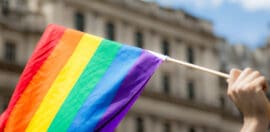‘A really big wake up call’: documenting the experiences of LGBTQIA+ refugees

29 March 2023 at 5:17 pm
The report has shed light on what forcibly displaced LGBTQIA+ people experience in Australia, and what can be done to improve their experience.
LGBTQIA+ refugees and asylum seekers in Australia experience ongoing discrimination and violence, a groundbreaking new report has found.
More than half of those surveyed for the Inhabiting Two Worlds At Once report, released by Forcibly Displaced People Network, reported experiencing very high levels of discrimination in services, education, employment, housing and health care.
And 60 per cent of those surveyed had experienced at least one form of violence in Australia — 15 times the average rate of violence in Australia.
The report, which is the first to specifically ask LGBTQIA+ forcibly displaced people about their experiences, also found there is a need to act to provide better services and support for LGBTQIA+ refugees and asylum seekers.
Violence and discrimination
The report surveyed 82 refugees and asylum seekers living in Australia, as well as some international students, to determine their experience in the country as members of the LGBTQIA+ community.
More than half of the people surveyed said they felt discriminated against by services due to gender or sexuality, race or ethnicity, or migration status.
Twenty-seven per cent of respondents reported multiple experiences of discrimination by services.
And participants said this discrimination was having an impact on their mental and physical health.
Almost half of responses about negative experiences indicated people had faced racism, homophobia and transphobia, as well as a lack of cultural awareness.
But of those who experienced discrimination, very few lodged complaints.
Ten complained about discrimination by service providers, seven about discrimination in education, 14 about discrimination in employment and five about discrimination in healthcare.
According to the report, the most common reason not to lodge a complaint was “I did not think the situation will resolve”.
In many cases, respondents indicated they did not seek help from particular services, because they were unsure whether a service was LGBTQIA+ inclusive. Respondents also indicated they didn’t know the service existed, or weren’t sure whether it would assist them or whether it would be culturally responsive.
Fifty-three respondents agreed to answer questions about their experiences of sexual and gender-based violence both in Australia and prior to arriving. Of those, 75 per cent had experienced such violence before coming to Australia, and 37 per cent had experienced violence after arriving.
This violence most commonly included emotional abuse, verbal abuse, sexual harassment and physical violence.
The report notes that “if we consider only those who chose to answer the question, the percentage rises to 60 per cent of participants who experienced violence in Australia”.
But after experiencing violence, only 17 per cent said they had attempted to seek relevant support.
Two reported no subsequent positive outcome.
Some respondents also indicated that they had had positive experiences in some cases. These positive experiences occurred when a service demonstrated an understanding of a person’s circumstances and offered them relevant services, or validated people’s experiences.
Services were also considered positive when they created a sense of inclusion and belonging, used inclusive language, or had training in LGBTIQA+ displacement and used this knowledge to inform service delivery.
What happens now?
A spokesperson for Forcibly Displaced People Network told Pro Bono News the study would be used to inform advocacy to government and services for improved support for LGBTQIA+ forcibly displaced people.
She said the results confirmed much of what the network had heard before, as well as some more serious concerns.
“For example, when we look at the experiences of sexual and gender based violence, we obviously knew that for this particular cohort, that is an overwhelming experience,” the spokesperson said.
She added this research is stage one of a larger project, with stage two to take a more intersectional approach and look into access to education, employment and healthcare.
The spokesperson said the report should encourage service providers to consider how they provide assistance to LGBTQIA+ refugees and asylum seekers.
“I think this is a really big wake up call for lots of those services to actually finally recognise that this particular cohort requires that different approach. It requires more trust building, more training for services themselves to be able to provide that really safe and inclusive space,” she said.
“There needs to be a much bigger will to change within the community services when it comes to this cohort.”
In many cases, the spokesperson explained, services take a heteronormative view as standard, which can lead to a lack of inclusion and trust among clients.
Healthcare services also take a citizenship-centric approach, requiring Medicare to access services. But many people on temporary visas aren’t eligible for Medicare, meaning they are excluded from accessing the healthcare service they need.
“It’s really understanding that one size doesn’t fit all,” the spokesperson said.
“We just really need to understand what our specific clients need and work to meet them because what we’re sometimes getting told is ‘it’s under-resourced, we’re so busy’, but then somehow if you look at who’s getting good outcomes, they’re all non LGBTQ+ people. So it’s not the question of being under-resourced or being busy, it’s the question of really not paying attention to what the specific needs are.”







